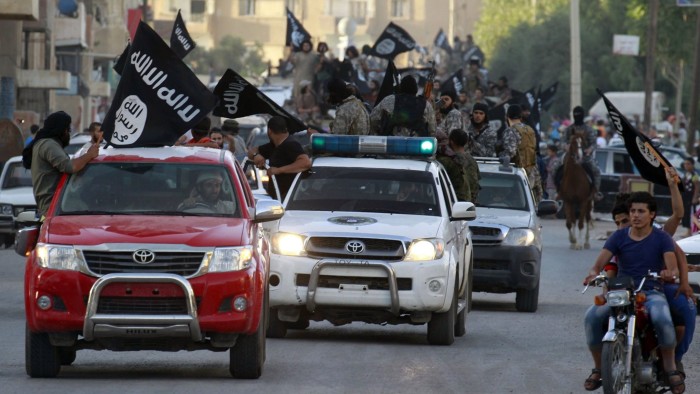Isis is down, but not yet out

Roula Khalaf, Editor of the FT, selects her favourite stories in this weekly newsletter.
There has been welcome news recently on the fight against Isis. The killing in an air strike of Abu Mohammad al-Adnani is a significant gain. Adnani was a respected figure in the terrorist group, both as its leading ideologue and head of external operations. His death follows the removal of other leading Isis figures, including the group’s second-in-command, and its military chief. Others will step up, but it will take time for them to gain experience and credibility.
This is the latest in a series of setbacks for Isis, prompting some analysts to claim that it is in terminal decline. Isis has also lost territory, which is important to it as it claims to be building a caliphate, a region where a supreme Islamic leader prevails.
The attempt to create a caliphate has clearly failed: the parastatal structures have not delivered essential services and Isis has been violent and oppressive. People in liberated towns have celebrated its ousting. And Isis morale seems to be slipping: its online narrative is less polished and has become more sectarian and hectoring as it tries to explain its setbacks.
But Isis cannot be written off. It remains dangerous, with a large area under its control. It has yet to be challenged in its strongholds in Raqqa in Syria and Mosul in northern Iraq. Ground operations against either city will be difficult and bloody, especially if non-native forces — Kurds in Arab Raqqa, Shia militias in predominately Sunni Mosul — are deployed.
The Syrian theatre remains a mess. Russia and Iran are propping up the regime of Bashar al-Assad. Arab and western efforts to bolster opposition forces are doing little more than keeping them going. No one expects President Barack Obama in his remaining months in office to raise the level of US military exposure beyond the anti-Isis campaign. In Turkey, President Recep Tayyip Erdogan is focused on cementing his power following the recent attempted coup. The Syrian conflict is set to rumble on, and as long as Syria has no popularly accepted government in control of its territory, there will be space for terrorist groups to operate.
It is impossible to judge just how weakened Isis is. It could take many months, maybe years, to remove it from its strongholds. Eventually it will be forced to disperse, with fighters returning to their home countries or to places where they can operate more freely, such as across the Sahel or in Yemen. As you squeeze the terrorist balloon, it bulges out in multiple new locations. The individuals and their networks are more important than any particular territory. A “virtual” Isis will emerge.
The terror threat in Europe in the short term could well increase as Isis responds asymmetrically to the pressure it faces. The group is close to Europe and has a large pool of foreign fighters at its disposal, and there seems to be no let-up in terrorist planning.
Europe is now on high alert after the terrorist attacks of the past two years. The flow of new recruits to Syria has slowed to a trickle, and returnees face closer scrutiny and surveillance. But some of those already back in Europe are committed to the extremist cause: returnees from Syria took part in the atrocities in Paris and Brussels. Others little-known to western security services will be inspired to violence in the name of Isis. Across Europe, the risk of further attacks remains high.
In terms of threat, Isis is the crocodile closest to the canoe, but al-Qaeda remains in the picture. There is a watchful coexistence between the two movements for now, tinged with animosity. In the long term, al-Qaeda is a more sustainable organisation than Isis and remains a major problem.
To some extent, the west can shield itself from the threat by active intelligence operations and close links between intelligence and law enforcement. Gradual stepping up of security measures to meet the rising threat is a much better course than a sudden populist lurch in the wake of the next ghastly atrocity.
As Isis loses territory, the battle will shift back to the internet. Both Isis and al-Qaeda pursue an active online narrative, aimed at known supporters and potential lone wolves. Co-operation between technology companies and security agencies is improving again as the impact of the Edward Snowden affair fades, but there is a long way still to go, especially in terms of the tech companies policing the communications channels they provide. For example, UK government agencies alone still have to demand the removal of around 1,000 postings a week. This should be the companies’ responsibility.
There is no single way to defeat Isis and al-Qaeda. It will require sustained military pressure, which the west can lead, but which on its own will not be enough. The root causes of discontent also have to be tackled, especially in the Arab world, and that can only be done by Muslims themselves. There are encouraging moves towards a different economic and political dispensation in Saudi Arabia under deputy crown prince Mohammed bin Salman, but there is a long and difficult path to pursue before that becomes a reality. Syria and Libya are nowhere near even starting down that road. For the foreseeable future, the west will need to keep its guard up.
The writer is chairman of Macro Advisory Partners and a former Chief of MI6
Comments